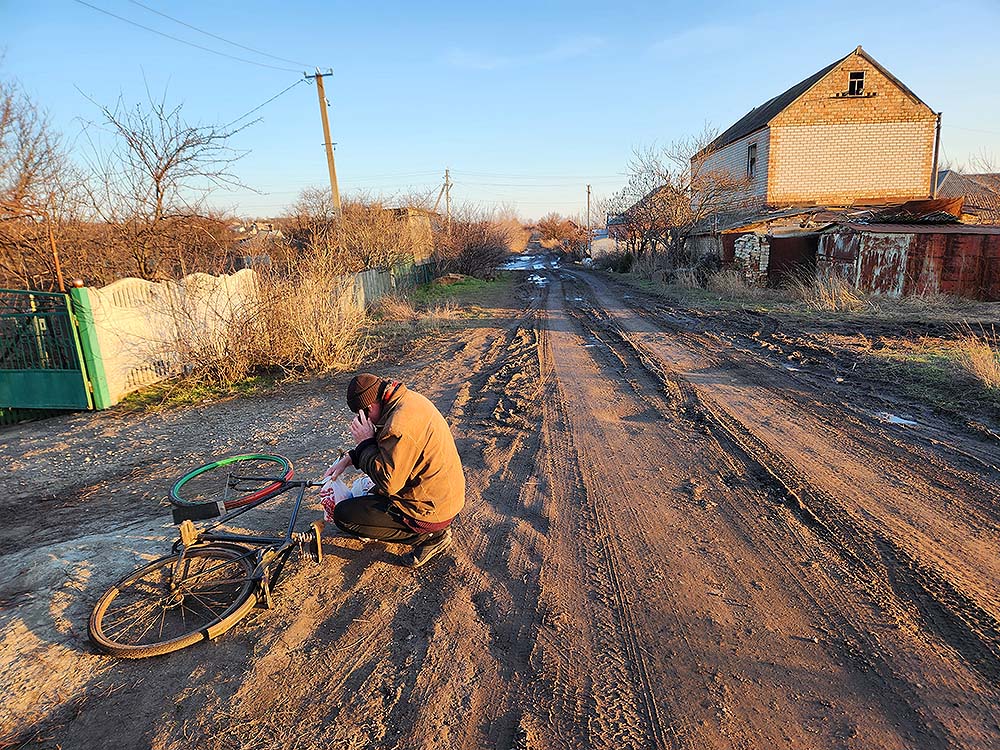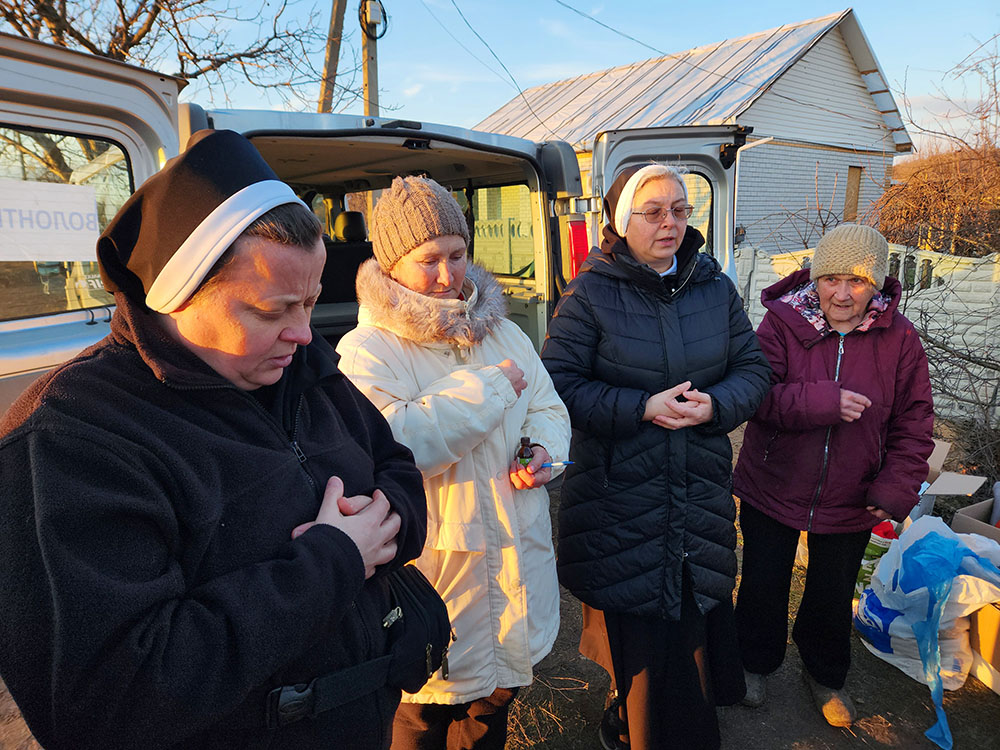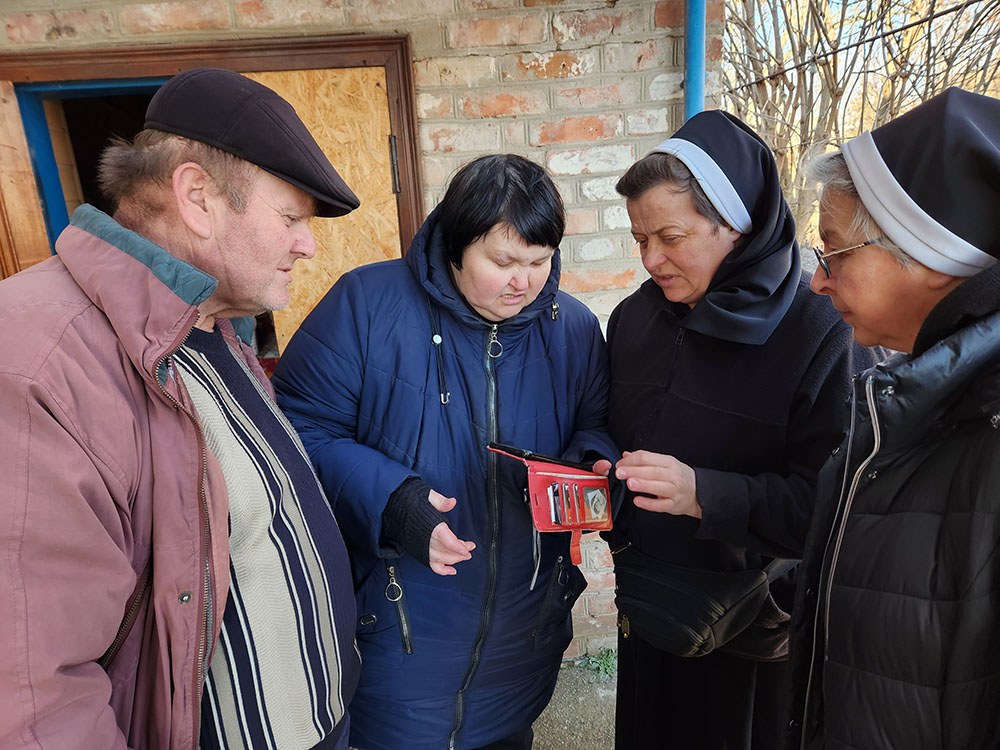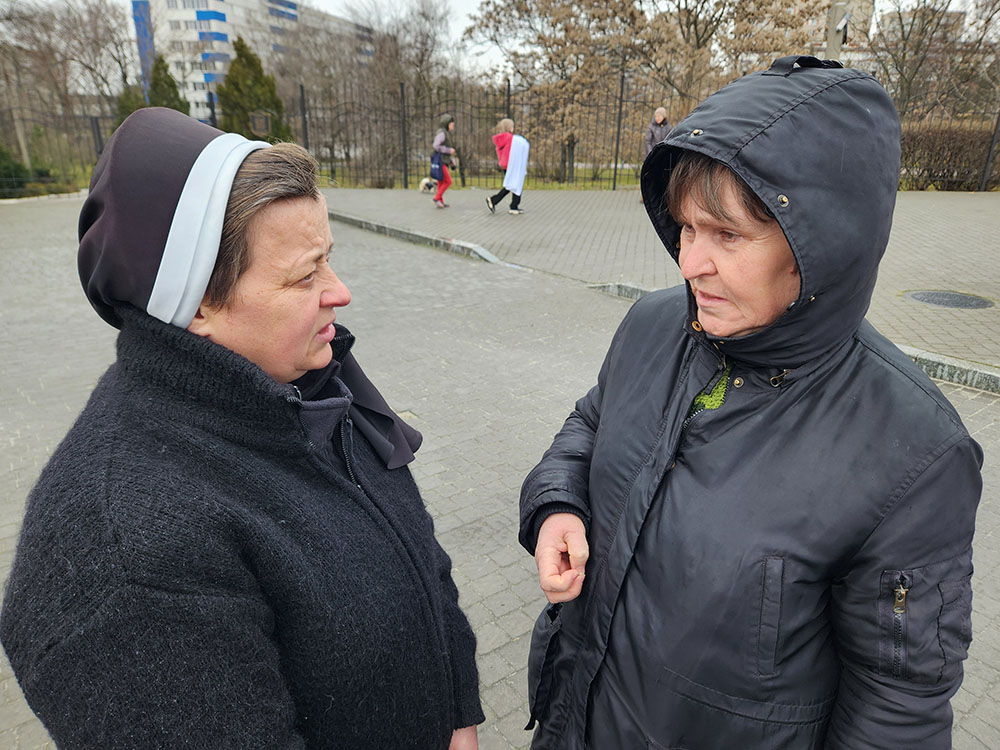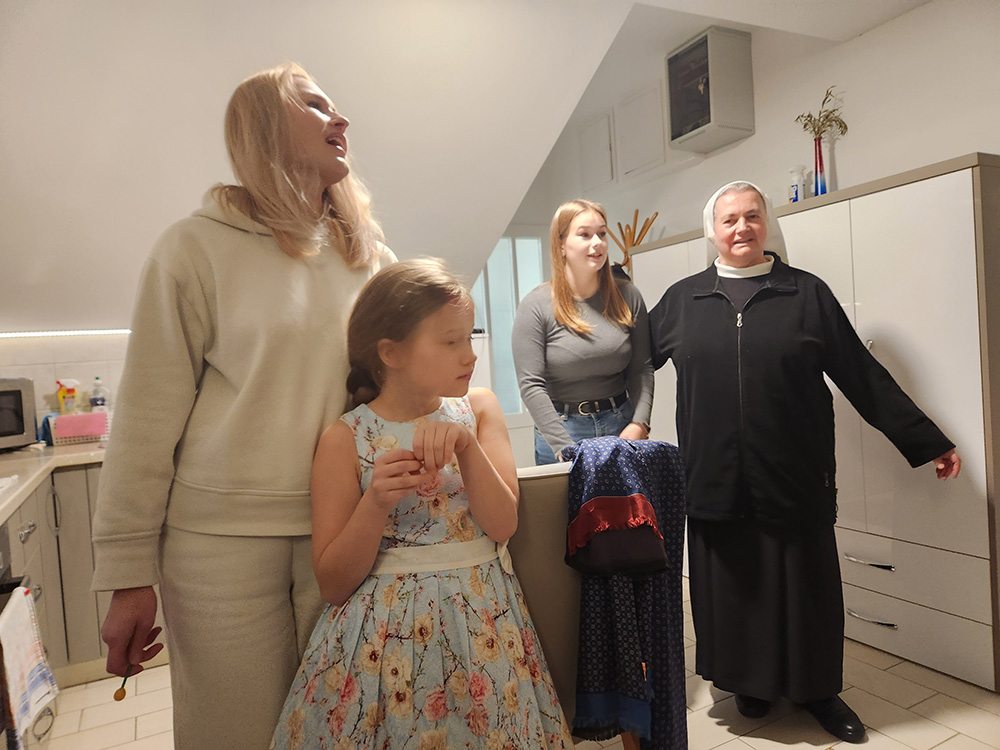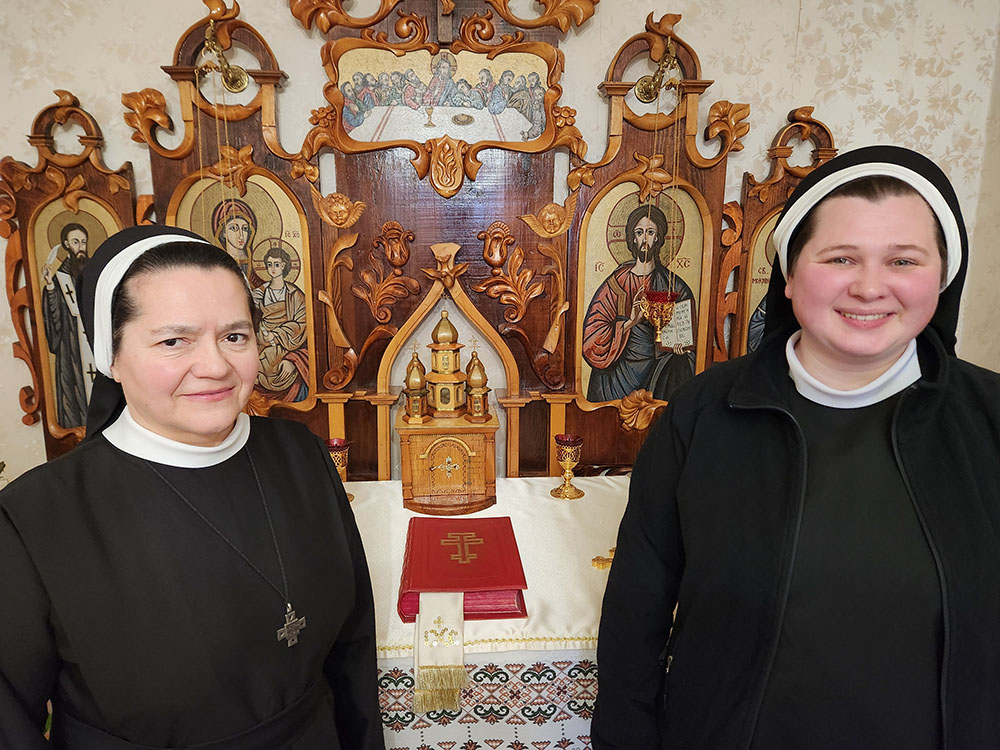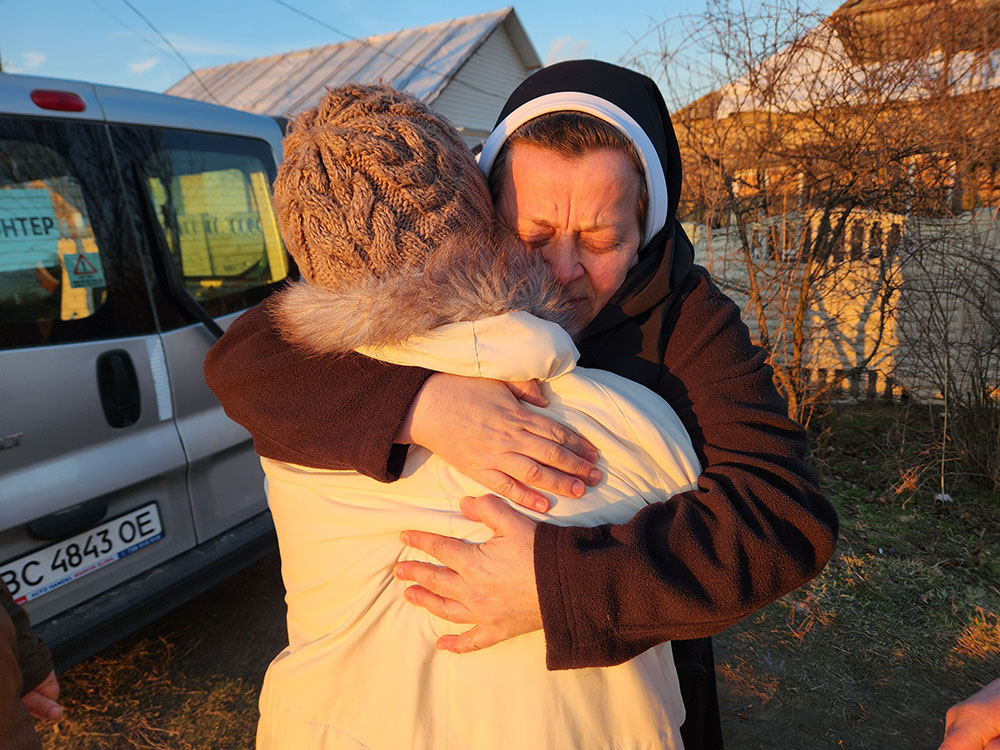
Sr. Lucia Murashko, a member of the Order of St. Basil the Great, hugs a resident of the village of Orihiv, eastern Ukraine, during a delivery of humanitarian supplies earlier this month. (GSR photo/Chris Herlinger)
As the winds drew closer to the southeastern Ukrainian village of Preobrazhenka on a clear, cloudless afternoon earlier this month, so did the sounds of artillery bombardments.
The noise, coming from Ukrainian forces on the frontline about 5 miles away, did not faze the residents of the small village. They have grown accustomed to the steady din after the full-scale Russian invasion of Ukraine began on Feb. 24, 2022 — two years marked by terror and resignation, displacement and loss.
"We can't plan anything," said Inna Sirinok, 52, a teacher who lives with her husband, Yurii, 55, with friends in another village because the couple's home was destroyed in a series of bombardments in 2023. "Now we live in fear, scared all of the time."
These are among the poorest of Ukrainians — rural folk who survive tending small plots of land and gardens, raising cows and chickens. Their roads are unpaved and muddy. They remain where they are because they see no alternative but to stay put and hope for the best — that the war will end, that the sound of shelling and bombardments from the Russian side will stop.
"You get used to it," said Yurii. "We call it birds singing."
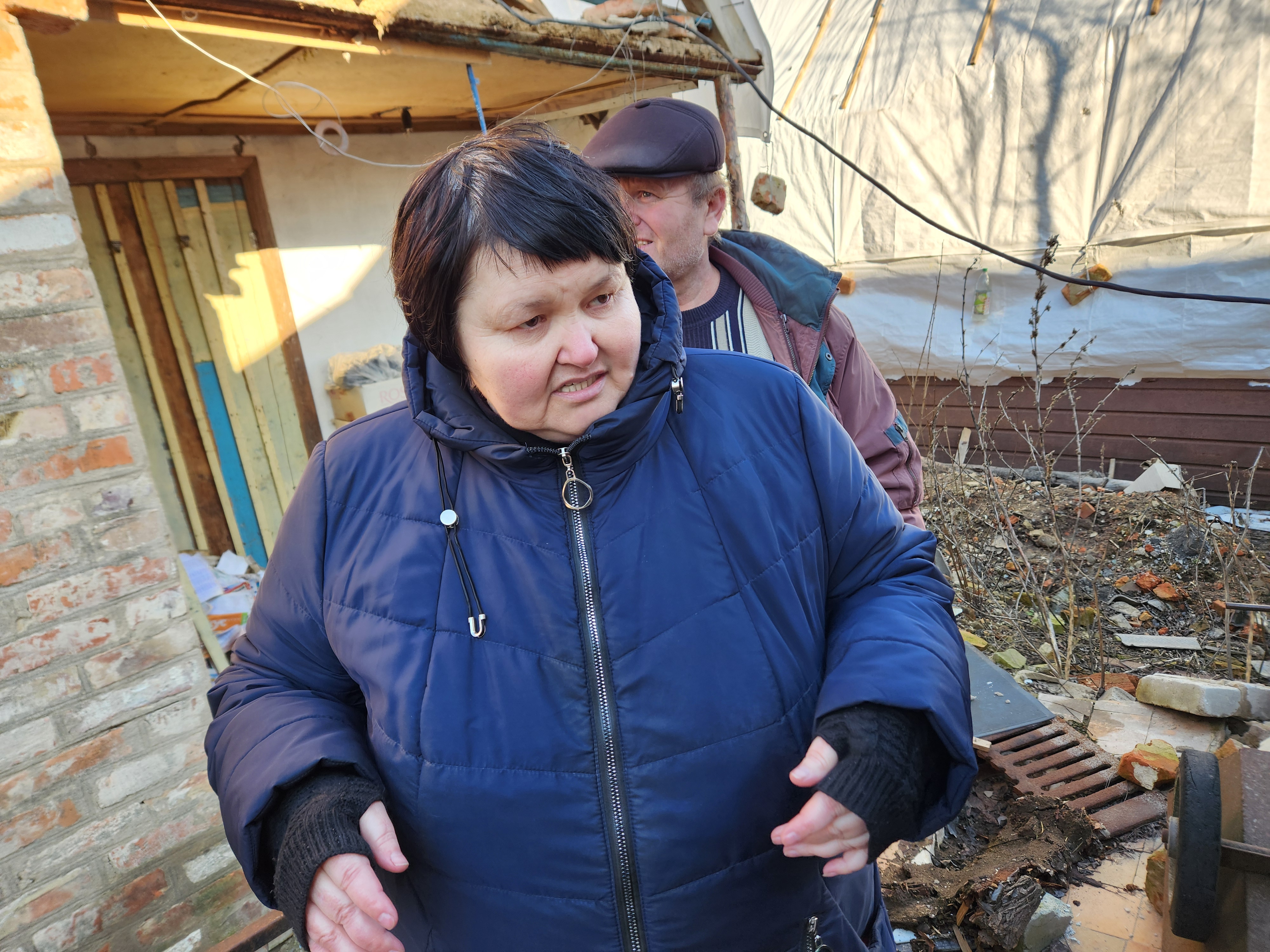
Inna Sirinok, and her husband, Yurii, survey their destroyed home in the eastern Ukrainian village of Preobrazhenka "We honestly don't have the strength to recover," Sirinok said, so considerable is the amount of damage to the house. "We have to start over," added Yurii, 55. "We don't have the strength. We're elderly." (GSR photo/Chris Herlinger)
Despite such expressions of irony, one of the Sirinoks' neighbors in Preobrazhenka, Tetiana Bilyk, 33, said the war has altered the village's view of life itself. "We've changed our understanding of the world — it is so difficult now. We value peace and quiet more than ever now."
And yet, "with God's help, we survive," she said.
That source of hope is made tangible by the presence of the Sisters of the Order of St. Basil the Great, who continue to visit Preobrazhenka and other nearby villages at least once a month — though not as frequently now as during the first year of the war, when the sisters were flush with donated humanitarian aid they distributed.
But the sisters, who live in the city of Zaporizhzhia, about 40 miles north of the village, remain a steady, welcome presence at a time when Ukrainians in poor villages like Preobrazhenka speak of the importance of not being ignored. Ukrainians of all locales, in small villages and large cities alike, are worried that the world at large — preoccupied by other global events, such as the war in Gaza — is forgetting their cause.
"We're all tired of the war. Our first wish is to have peace," said Sr. Lucia Murashko, 49, who along with Sr. Romana Hutnyk, 54, delivered packages of detergent and cleaning items to the Preobrazhenka villagers. "But it doesn't mean we give up."
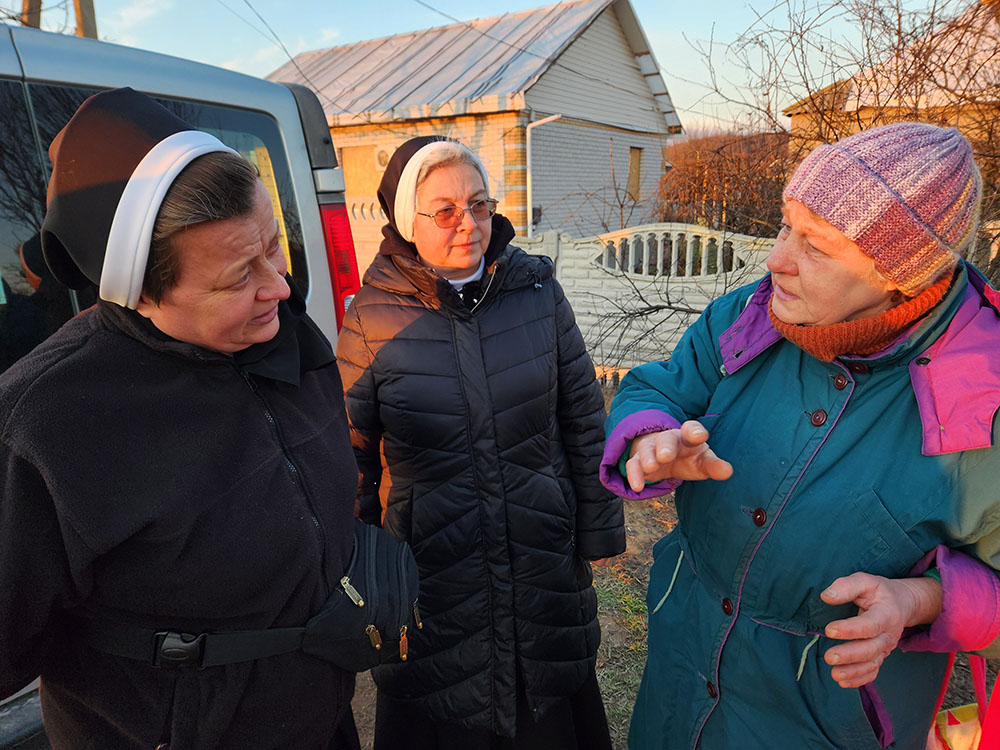
Srs. Lucia Murashko, left, and Romana Hutnyk, members of the Order of St. Basil the Great, speak to a resident of the village of Orihiv, in eastern Ukraine, during a delivery of humanitarian supplies earlier this month. (GSR photo/Chris Herlinger)
"Yes, we've become accustomed to war and that's very unnatural," Murashko said. "But we don't have a choice. We have to live to survive. If we live, it means a victory — victory over death."
It also means a steely resolve about the Ukrainian cause that, as one villager, Klavdia Paslavska, 67, put it, "all ours should be ours."
"We won't give up," said Diakova Lubov, 58, a cancer survivor displaced from a nearby village. She now lives in a dormitory residence for displaced persons in Zaporizhzhia, and is also the recipient of other assistance from the St. Basil sisters. "We wait for victory."
A 'hole in everyone's hearts'
The persistent hope that, ultimately, Ukraine will prevail in the war remains undiminished among many Ukrainians who spoke in interviews recently to Global Sisters Report — some of whom were interviewed in 2023.
But there is recognition that the war has taken a toll in the last year and that the stalemate on the front is being keenly felt — as is concern that support from the West, and in the United States in particular, for the Ukrainian cause may wane.
"This war has put a huge hole in everybody's hearts," said Sr. Yanuariya Isyk, a 53-year-old St. Basil sister, whose ministry is based in the capital. "But I am grateful for the countries who still believe in us."
"It's been a difficult year," acknowledged Dominican Fr. Petro Balog, 46, who heads the Institute of Religious Sciences of St. Thomas Aquinas in Kyiv. "I think many people — not all, but many — are feeling pessimistic right now."
The hope that Ukraine could defeat the Russian forces and even recapture the 1991 borders it shared with Russia after the fall of the Soviet Union is being tempered now with the recognition that, despite an initial poor showing by Russia in early 2022, its military remains a formidable force. (This was reconfirmed this week by news of a Ukrainian retreat from the eastern city of Avdiivka.)
Tetiana Stawnychy, the president of Caritas Ukraine, noted, "The war has gone through different dynamics over the two years."
"In the beginning, it was shock, and then there was this resolve to do everything that we could to respond, a kind of a 'no-regrets' approach to respond to that huge number of people who were fleeing in the beginning."
According to United Nations data, as of mid-February, 6,479,700 refugees have fled Ukraine due to the war. In addition, by one other estimate, the conflict has displaced more than 3.6 million within the country.
Following the initial crisis, some areas liberated from Russian occupation required assistance, Stawnychy said. But then came a "kind of waiting for what would happen next, and there was some anticipation that there would be that continued movement in 2023."
That didn't happen the way that many had anticipated, she said, "but the humanitarian response remains huge [because] the needs remain huge."
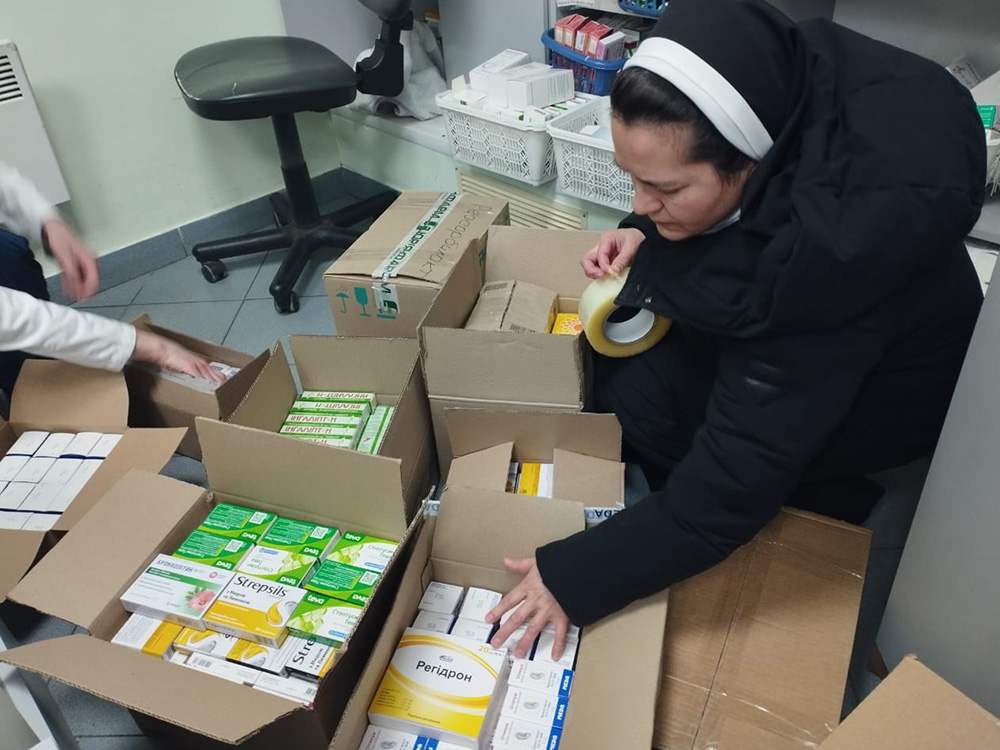
Sr. Yanuariya Isyk, a member of the Order of St. Basil the Great, checks on supplies headed for children and soldiers in war-torn sections of Ukraine as part of a volunteer effort she coordinates. (Courtesy of Yanuariya Isyk)
Stawnychy cited a United Nations report that noted that as many as 15 million, or roughly 40% of Ukrainians, need some kind of humanitarian assistance.
With a Ukrainian victory not on the immediate horizon, Ukraine's humanitarian situation "has become even more extreme," Denise Brown, who coordinates the United Nations' response in Ukraine, said in the report.
"As the war ravages villages and towns close to the front line," Brown said, "humanitarian needs in these areas are reaching catastrophic levels. The situation cannot improve unless the war stops."
She added: "Entire communities close to the front line are being pummeled daily, leaving millions with little to no capacity to provide for themselves, and dependent on humanitarian assistance."
It all takes a toll, observers say.
"I don't think people are feeling as optimistic or even enthusiastic [about the war] as one or two years ago," Balog said, citing disillusionment with government corruption as one factor — though he added, "We can't imagine a future without victory."
That is because, given the evidence of Russia's actions both since 2022 and in annexations on Ukrainian territory since 2014, Ukrainians worry about the potential for "a new kind of genocide," Balog said. This is based on fears of Russia wanting to eliminate Ukrainian culture and language.
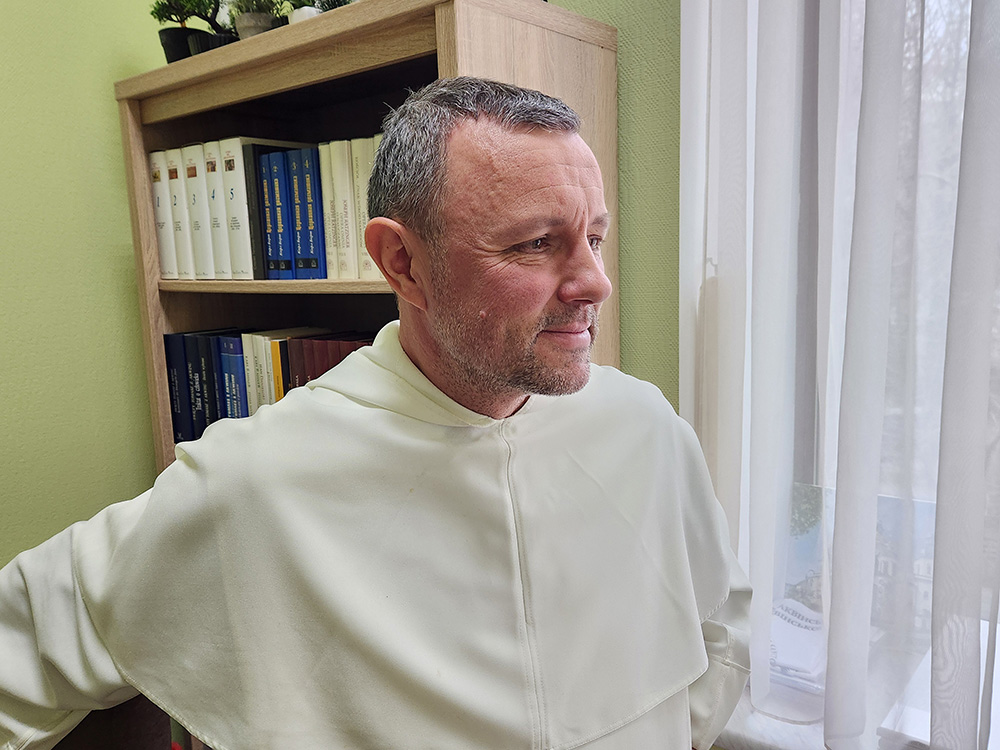
Dominican Fr. Petro Balog, who heads the Institute of Religious Sciences of St. Thomas Aquinas in Kyiv, at his office. "I think many people — not all, but many — are feeling pessimistic right now," he said in a recent interview. (GSR photo/Chris Herlinger)
Still, Balog said he believes "in miracles" and thinks ultimately Ukraine will prevail against Russian domination — though it may take years.
Refugees in Croatia
In the meantime, the arrival of refugees has changed the face of many countries, especially those once in the Soviet Union's orbit.
In Croatia, once part of the former Yugoslavia, it is believed that more than 22,000 Ukrainians had entered the country by the end of 2022 — though it is possible that many left the country for other destinations, said Stanko Perica, the regional director for Jesuit Refugee Service based in the Croatian capital of Zagreb. He estimates that perhaps 10,000 Ukrainians remain in Croatia.
Three of them are members of the Ouchynnikova family, who have settled in the coastal city of Split — though, like other Ukrainians in the last year, they have begun to make short trips back to Ukraine to see family.
They are being accommodated in available space by a community of sisters belonging to the congregation of the Sisters of Charity of Zagreb — one of many congregations in Europe that opened their doors to refugees following the 2022 invasion.
Maria, 37, left with daughters 16-year-old Sofia and 8-year-old Anastasia and arrived in Croatia a month after the full-scale invasion began.
Maxim, Maria's husband and Sofia's and Anastasia's father, remains in Kharkov in northwest Ukraine to continue his work at a military factory. Mother and daughters visited Maxim at the end of 2023 for two weeks. They said that saying goodbye and returning to Croatia were difficult.
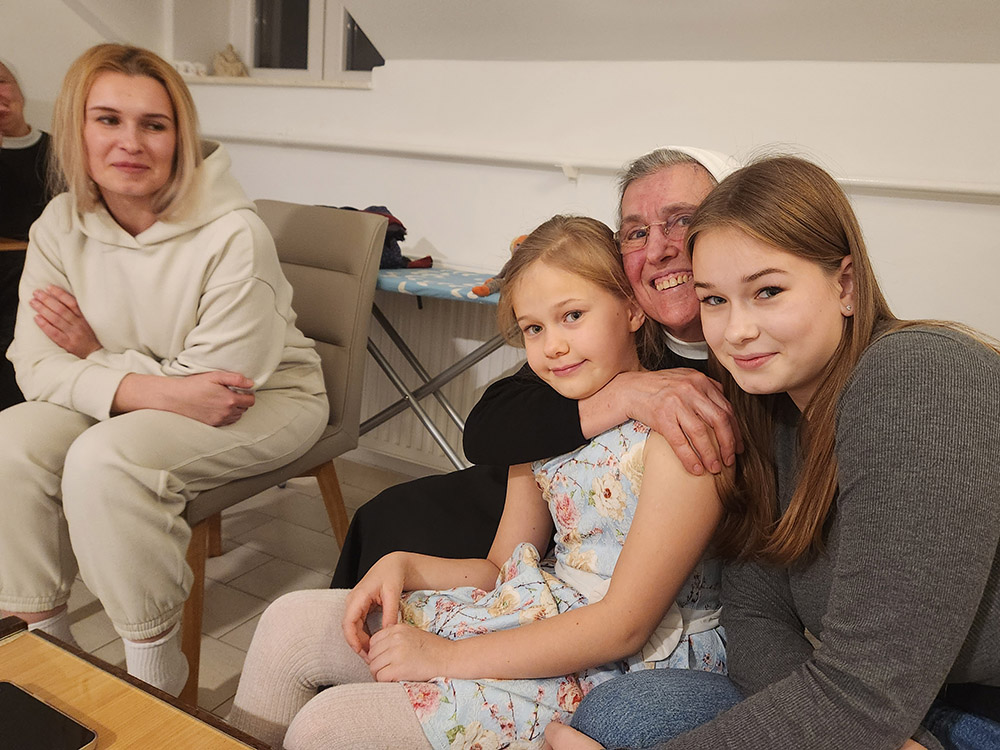
Sr. M. Franka Odrljin, center, a member of the Sisters of Charity of Zagreb in Croatia, with members of the Ouchynnikova family, who have settled in the coastal city of Split, living in a convent space provided by the sisters. Maria, 37, the mother, is at left with daughters 16-year-old Sofia, right, and 8-year-old Anastasia, center. Odrljin is the director of the sisters' Split refugee ministry.
But Maria added, "It is still better to be here. ... It's still not really safe to be in Kharkov," which is often the target of Russian bombardments.
She added: "We thought we'd be here two months, but it's been nearly two years now."
Both daughters are attending school and learning Croatian. Sofia has won accolades for her performance on a high school swimming team. Meanwhile Maria, once a lawyer in Ukraine, is working as a restaurant chef.
Adjusting to a new life has not been easy, though the family says the sisters have welcomed them warmly. "They're like a second family," Maria said. "We love them so much."
Provincial Superior M. Andrijana Mirčeta, 69, and Sr. Marija Blaga Bunčuga, a former general superior, 71, said when the Croatian Bishops' Conference asked for the country's religious communities to open their doors to arriving refugees, it was an easy decision. The congregation had the space in its Split convent, and members prayed and discerned that this was something that St. Vincent de Paul, whose charism the congregation follows, would surely want.
The sisters also said their own experiences in the Croatian war of independence in the 1990s were a factor. Both lived in the war-hit town of Zadar at the time; Mirčeta helped deliver aid to shelters of displaced persons and Bunčuga recalls such terrors as a Serbian-launched bomb hitting their convent on Dec. 31, 1991. However, luckily no one was killed or hurt because older sisters living there had been taken to a safe area the month before.
Advertisement
"It was an awful experience," she said of the bombing. She remembered fleeing the building, adding that her immediate thoughts flashed to praying for Croatia’s enemies. "That was very important."
Mirčeta said that given those experiences, there was no question of helping people in a "desperate situation."
She added that she feels there is a "very close connection between us and the Ukrainian people."
"We were fighting, and they are fighting now, for liberation," she said. " So, we know what that's like."
That history may explain why Croatians welcomed the Ukrainians. Certainly, Jesuit Refugee Service's Perica said, he and members of his staff "are very happy with the way Ukrainians were and still are welcomed in Croatian society."
He said the welcome is proof that Croatia "could help many more people, and in the Ukrainian crisis we showed that we are ready and capable to do it."
A look toward the future
If looking back at other European wars is part of the story of the last two years, so is looking toward the future — a future that all hope will be brighter and more secure than it is now.
Already some are working to heal society's wounds.
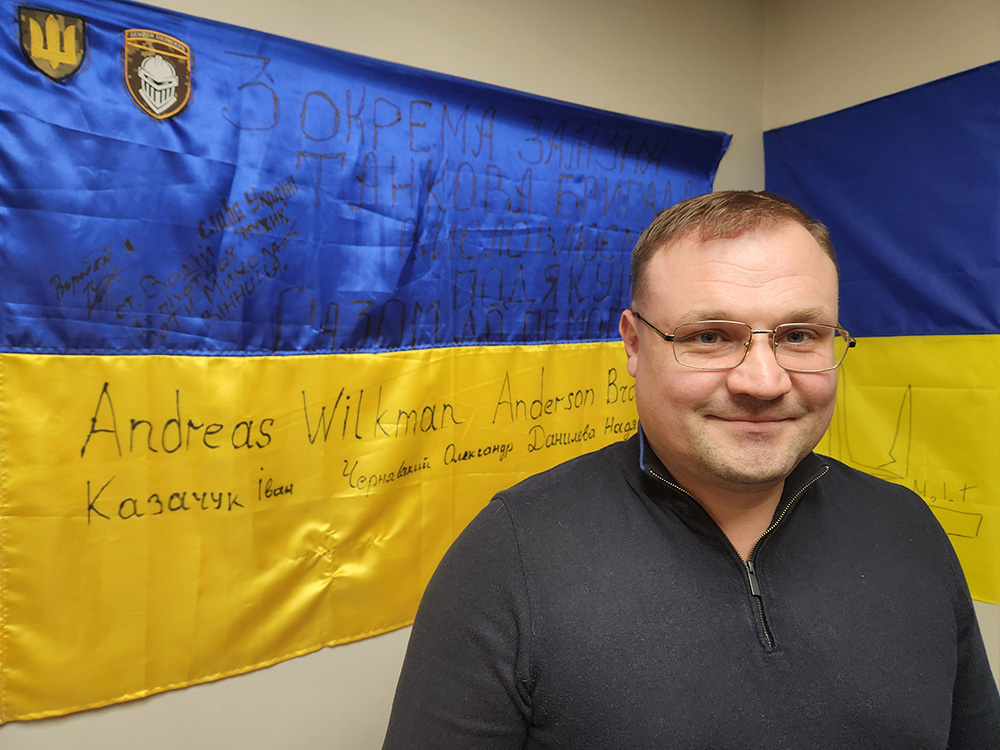
Mykola Vouchenko, a therapist and psychologist, heads a Kyiv-based organization helping returning Ukrainian veterans who have post-traumatic stress disorder and are making the adjustment to civilian life. (GSR photo/Chris Herlinger)
Mykola Vouchenko, a therapist and psychologist, heads a Kyiv-based organization helping returning veterans who have post-traumatic stress disorder and are making the adjustment to civilian life. He said that such work will expand in coming years with a greater number of veterans returning to their former lives.
Ukrainian society has a chance "to build a better country" by welcoming former combatants "back from hell" and creating an atmosphere so that they can become well-adjusted citizens, Vouchenko said.
"The soldier's part of the contract was to protect the country," he said. "Our part of the contract, the second part, is to help them with their transformation to become people of wisdom."
In doing that, he said, veterans can "help us create a great, great country."
Similarly, Sr. Anna Andrusiv, 35, whose ministry as a Sister of St. Basil the Great moved in 2023 from the western city of Lviv to the capital of Kyiv, said her congregation recently purchased a three-story residence in northwest Kyiv in hopes of turning it into a monastery for the sisters, and also a rehabilitation center for the wounded, a center for soldiers and their families, especially children.
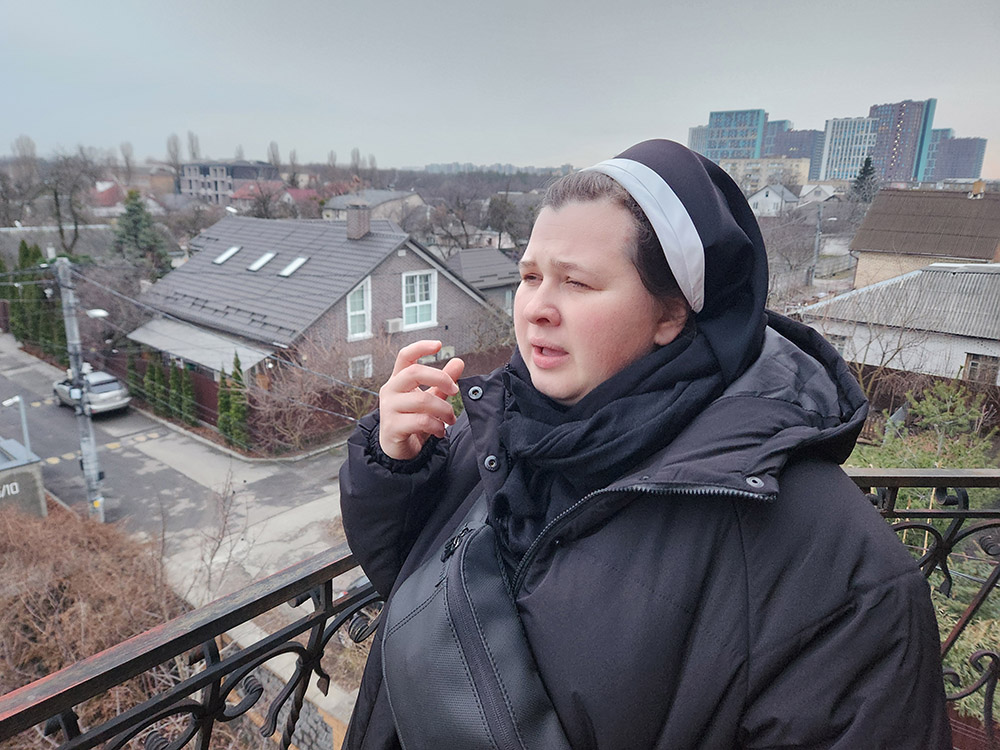
Sr. Anna Andrusiv, 35, whose ministry as a sister of St. Basil the Great recently moved from the western city of Lviv, Ukraine, to the capital of Kyiv, at a three-story residence that her congregation purchased in hopes of turning it into a monastery for the sisters, but also a rehabilitation center for the wounded, a center for soldiers and their families, especially children. (GSR photo/Chris Herlinger)
It will be open to all seeking spiritual solace. "We already know there is a need for this for everyone suffering trauma," she said.
A spiritual component is all-important, Andrusiv and Isyk said in an interview in a small apartment that serves as an urban monastery for several St. Basil sisters.
For her part, Isyk has continued her ministry in coordinating volunteer-led efforts to send supplies to soldiers and to children living near the front lines in eastern Ukraine. But she is worried that the country may be losing sight of its spiritual bearings as the war drags on.
She said people were more "deeply prayerful" in the first year of the war. But she is disappointed that that discipline seems to be waning among many Ukrainians. For example, Isyk sees less interest in a prayer group she leads, with attendance down.
"I wish people would come back to God," she said.
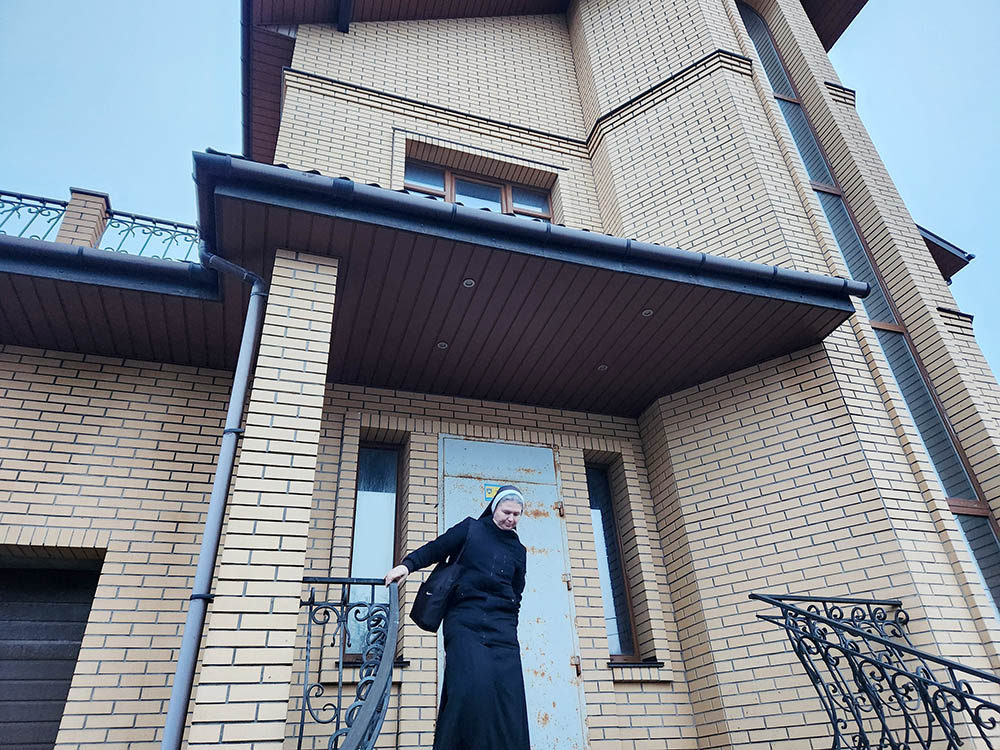
The Order of St. Basil the Great recently purchased this three-story residence in northwest Kyiv, Ukraine, in hopes of turning it into a monastery for the sisters, but also a rehabilitation center for the wounded, a center for soldiers and their families, especially children. In front of the residence is Superior Sr. Magdalyna Vytvytska. (GSR photo/Chris Herlinger)
Too much to bear
In Preobrazhenka, thoughts turn to God but also commingle with the earthbound realities of survival and fear. As the sound of daily bombardments continue, families like the Sirinoks wonder what the future holds.
Their comfort comes from the regular encounters with the St. Basil sisters, whose hugs and embraces, the villagers say, in some ways are more important than the aid they bring. In such encounters, the burdens of life are lifted, if even for just a moment.
Still, the villagers acknowledge that at times conditions can be almost too much to bear.
At the home which Inna Sirinok and her husband have abandoned, Inna pointed out to the sisters the building's condition: ruined living areas, covered with shards of window glass and shattered furniture.
She spoke anxiously as she described the couple's plight.
"We honestly don't have the strength to recover," Sirinok said, so considerable is the damage to the house. "We want to come back," she said, "but we don't know how or when."
"We have to start over," added Yurii. "We don't have the strength. We're elderly."
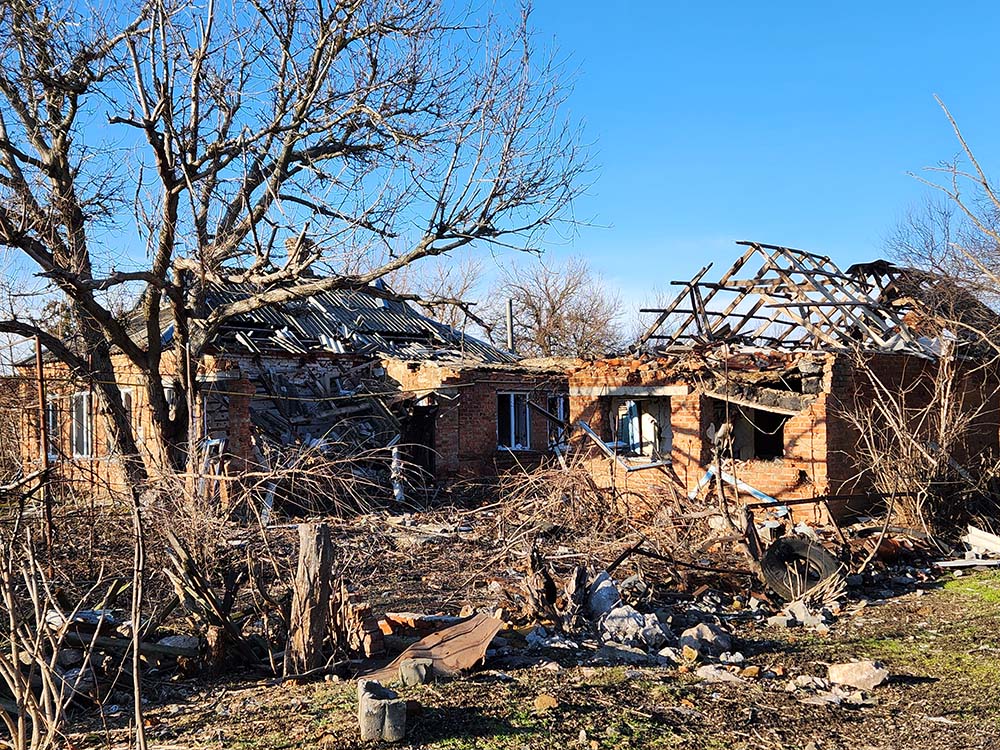
One of many damaged homes in the eastern Ukrainian village of Preobrazhenka (GSR photo/Chris Herlinger)
Such heartbreak is widespread, said Stawnychy of Caritas, noting that in Ukraine, a cornerstone of a family's safety net is owning a home, whether in a city or a village like Preobrazhenka.
There may be some 2 million homes destroyed in Ukraine now, she said. "That's a huge number of people whose security net has been somehow attacked or ripped out from under them."
Those are the physical costs. But there are other tolls — some of them unspeakably tragic — like the Sirinoks' neighbor who died after panicking and accidentally overdosing on anti-anxiety drugs.
"These stories are a piece of the horrors here," Inna said.
Yet Inna's continued online teaching to first-year students, including three special needs students, sustains her, as does the couple's love for each other and their belief in God — as well as the steadfast support of their neighbors.
And the visiting sisters.
As it got windier that afternoon in Preobrazhenka, the bombardments got louder — but the villagers seemed to take it all in stride.
"We always pray," Inna said, "and trust in God."

